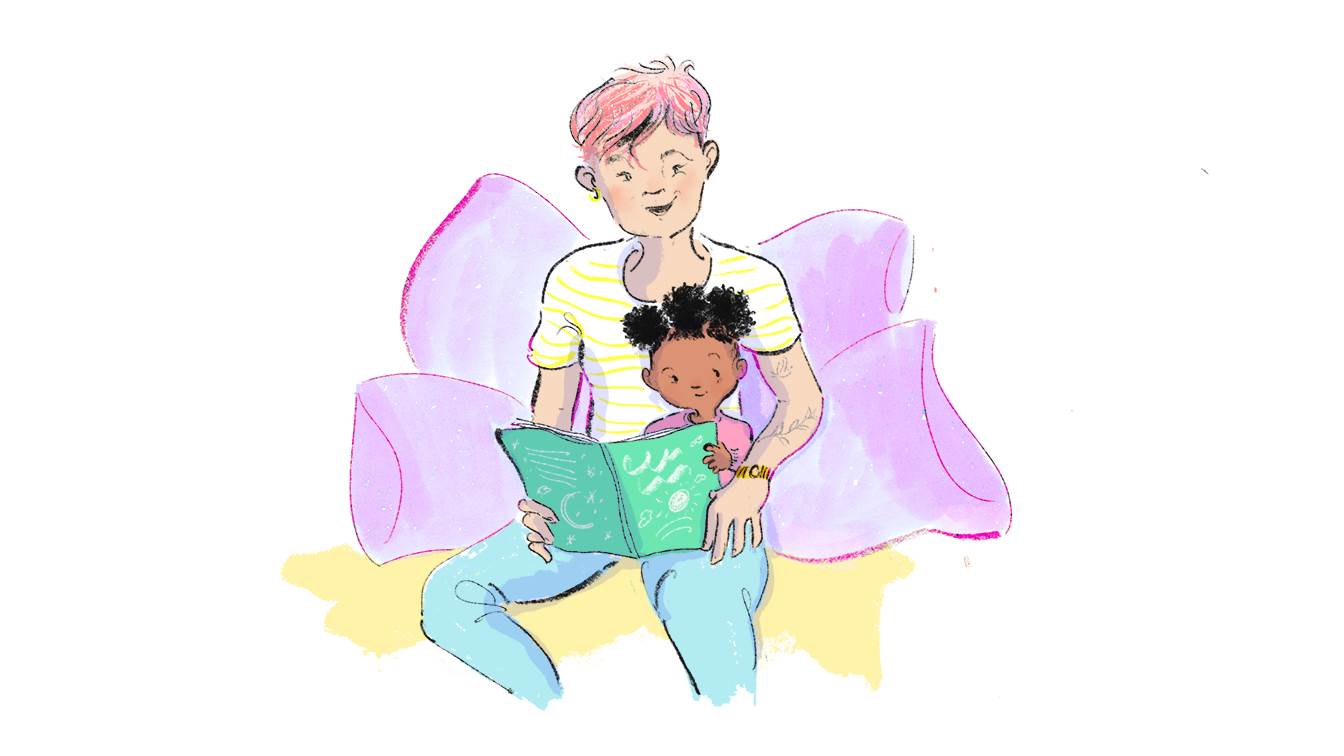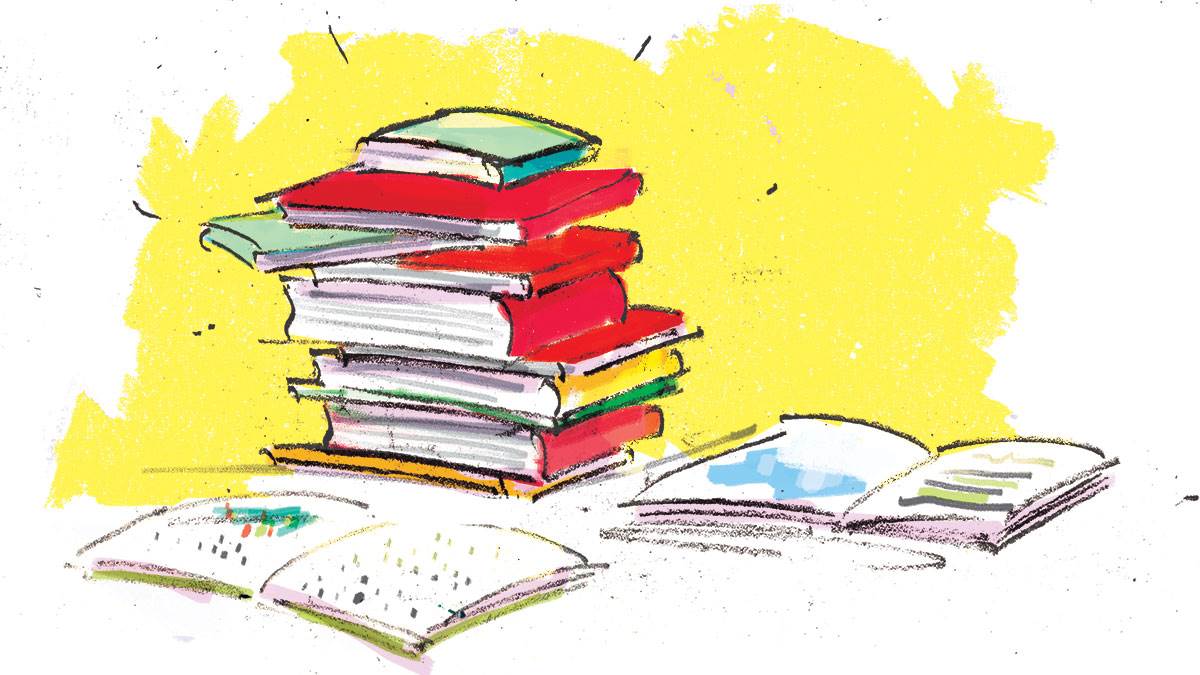Supporting reading for children with ADHD
Published on: 24 October 2022
Rachel Varney from the ADHD Foundation shares some useful tactics for helping children with ADHD enjoy reading.
 Illustration: Kip Alizadeh
Illustration: Kip Alizadeh
ADHD is not linked to intellect. However, some of the characteristics of ADHD can at times make it harder to concentrate, retain information, or keep focused. There can be difficulties around hyperactivity or impulsivity, or around ‘zoning out’. Children with ADHD can struggle with their emotional regulation and have weak Executive Functions – including working memory, learner anxiety, unhelpful coping or avoidance strategies.
“I would find myself at the end of the chapter & not remember anything I had just read… I realised that I would have to go back and read it all over again.”
Sophie – age 10
“I am a very slow reader. In primary school, I really hated to read because it took me a long time and I would have to read things over and over again.”
Reece – age 13
If we can identify that a child may be struggling with some of these elements this can really help with what we can put in place to support their reading. This support will develop their confidence, motivation and hopefully their enjoyment of reading.
Five top tips
1. Reading for pleasure
It is widely recognised that if we can encourage and promote a love of reading from early childhood this can play a huge part in the future success of children. For children with ADHD, if they are ‘hooked’ into a story this could provide the motivation to explore what happens more and more.
Sharing a book with a child – reading through the chapters each night, for instance – predicting what may happen, building the element of suspense, talking about the characters, likening them to people in our lives – this can all build momentum. Also consider that books do not have to be read – listening to an audio book can also be really powerful (and a great way of tapping into a wider range of books if limited at home).
2. Routine
For many families, there is the expectation from school that your child needs to practise reading each night. There is something to be said for incorporating this into some part of the family routine (as routine can really help a child with ADHD in general).
As an ex-teacher, I experienced many families becoming quite stressed or overwhelmed by this, especially if their child was avoiding this task. At this point I would strongly urge the parents not to worry and to not turn it into a battle. This type of reading activity could be carried out via many avenues – could you and your child take it in turns to read? Either page by page, paragraph by paragraph or line by line (depending on the text). ‘Book talk’ can be as powerful as reading the text – questions like why certain incidents have happened, what is your favourite character? If you were there, what would you do? This type of discussion can add meaning and more relevance to the text.
 Illustration: Kip Alizadeh
Illustration: Kip Alizadeh
3. Consider the environment
Maybe for this part of the day, could it be pre-negotiated with other family members to lessen distractions and give the child space to have a go at their reading activity? Is it time for a drink and snack too? Also consider setting a time limit to the activity – a clear end time can also motivate the child.
4. The importance of movement
In order for children with ADHD to thrive, movement needs to be encouraged and promoted. This can either be through movement breaks or micro movements throughout. Instead of a chair, are there other options? A yoga ball to sit on? A wobble stool? Do fidget toys help with focus? Is standing better? If your child can listen through an audio version of the book, do they have to sit at all?
They could walk the dog, go for a run, play outside whilst listening through headphones. It’s also really important to incorporate regular breaks to help avoid memory overload or focus becoming strained.
5. Celebrate/ encourage effort
For children with ADHD it is vital that we do this. If we consider some of the barriers around self-esteem and learner anxiety, the child can be lifted and encouraged by the praise received for their effort. The successful transference of dopamine (our reward hormone) is vital if ADHD if present. Praise and encouragement can really help to promote this. If the child does mis-read part of the text, instead of pointing out the error, one option is to just re-read the sentence using the correct word or phrase. Smiles and pride in the ‘having a go’ attitude shadow the effect of having weaknesses highlighted.
Book recommendations
ADHD Foundation Umbrella Gang Comics – Free to download from The ADHD Foundation Website
- The Adventures of the Umbrella Gang
- The Adventures of the Umbrella Gang Vol. 2
- The Adventures of the Umbrella Gang Vol. 3
The Hank Zipzer series, by Henry Winkler and Lin Oliver
Ellie Bean the Drama Queen, by Jennie Harding
Free Association: Where My Mind Goes During Science Class, by Barbara Esham
Cory Stories: A Kid’s Book About Living with ADHD, by Jeanne Kraus
The Tom Gates series, by Liz Pichon
The Wild Robot, by Peter Brown
You might also like...
Children's books featuring characters with ADHD
ADHD Awareness Month: How books are supporting one mum and her son
Writing fiction about ADHD: "I want children to see that it doesn't have to be a negative thing."
Topics: ADHD, Features, Reading Tips





